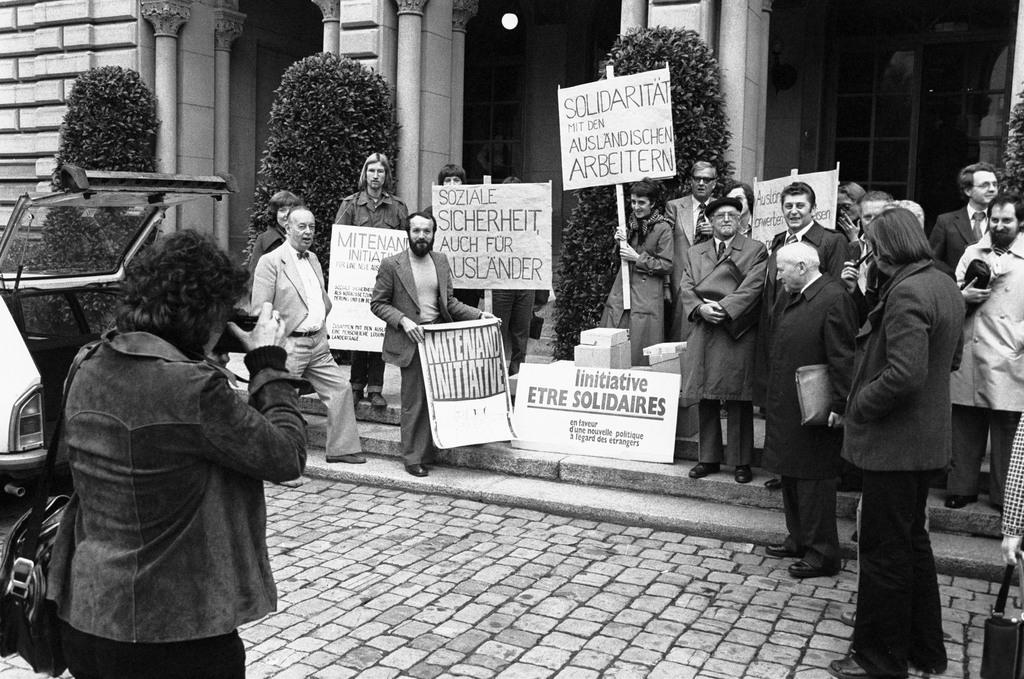The pioneers of a more open migration policy

Forty years ago, 3,000 people gathered on the square outside parliament in Bern. They demanded a more humane policy towards foreigners based on equal rights. How did the demonstration, organised by the national Mitenand (“together”) movement, come about?
In the 1950s and 1960s, Switzerland recruited hundreds of thousands of foreign workers. These “seasonal workers” were allowed to stay in Switzerland for a limited period, the idea being that during an economic crisis they could be sent home.
Those who were allowed to stay were told to assimilate. But the idea of new arrivals frightened some of the locals, and the fear of an excess of foreigners was exploited by politicians: in 1970, Swiss voters had their say on the Schwarzenbach Initiative, named after rightwing politician James Schwarzenbach, who wanted to limit the proportion of foreigners in each canton to 10%.
The initiative was rejected by 54% of voters, but it motivated many people to stand up against everyday and institutional discrimination. They called for integration not assimilation. They wanted foreigners to have the same rights as Swiss and for the labour and job markets to be just as open to foreigners as to locals.
In 1974, the Mitenand movement was born and soon received support from religious groups, liberals and those on the political left as well as immigrant organisations.
Together, they launched a people’s initiative, demanding equal rights for foreigners who had settled in the country. These people should be able to live in Switzerland with their families and not have the threat of deportation hanging over them, the organisers said. They also demanded the “seasonal worker” status be abolished.
The key sentence was: “The law considers the interests of Swiss and foreigners equally.”
Recipe for success?
Already in the 1960s there were efforts in various cities to bring together Swiss and members of the country’s foreign workforce. People would meet to play music, eat and just have fun. The Mitenand movement even launched a cookbook with recipes from Italy, Spain, Portugal, Greece, the then Yugoslavia and Turkey – the homelands of Switzerland’s foreign workers.

But it was not just about enjoying exotic food – the aim was to create a Switzerland that was fairer for everybody.
In 1977, enough signatures had been collected to be able to hand in the initiative; on October 28, 1978, the movement demonstrated on Parliament Square.
Parliament and the Federal Council recommended voters reject the initiative, and it took a while for a voting date to be announced. In the end, it wasn’t even close: in 1981, 83.8% of voters rejected it.
The minimal support for the initiative is probably the main reason why it has been forgotten. Yet Mitenand didn’t give up, for example organising holiday camps for children of Swiss and foreigners and getting involved in the asylum debate, which became more of an issue in the 1980s. The movement eventually disbanded in 1990.

More
When ‘old’ immigrants help ‘new’ ones
Translated from German by Thomas Stephens

In compliance with the JTI standards
More: SWI swissinfo.ch certified by the Journalism Trust Initiative












You can find an overview of ongoing debates with our journalists here . Please join us!
If you want to start a conversation about a topic raised in this article or want to report factual errors, email us at english@swissinfo.ch.